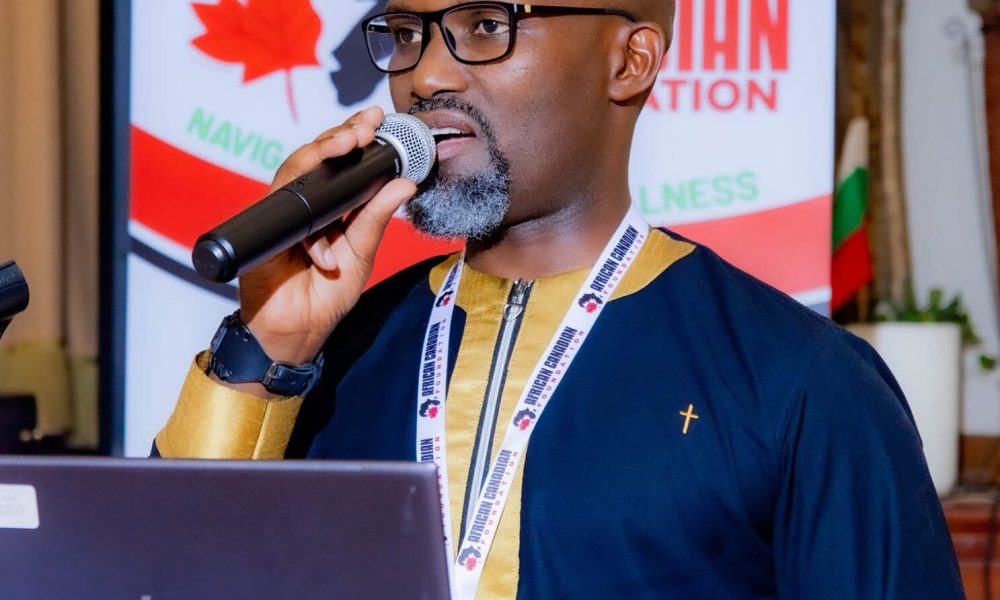
Pastor Jjumba Highlights Causes of Mental Illness at the Global Conference on Substance Use, Addiction, Suicide, and Mental Resilience 2024
“We Vowed to Never Again Avoid, Miss, or Dismiss the Signs of Suicide”— Pastor Jjumba
The Global Conference on Substance Use, Addiction, Suicide, and Mental Resilience 2024 successfully concluded this past weekend, bringing to light some of the most pressing issues facing the African Canadian community. Held from September 20th to 22nd in Toronto, Ontario, the conference was a groundbreaking platform for experts, advocates, and community members to discuss topics often shrouded in stigma—substance use, addiction, suicide, and mental health resilience.
Pastor Eddie Jjumba, a Licenced Minister under the Wesleyan Methodist Church – Central Canada District and prominent figure within the African Canadian community and a keynote speaker at the event, delivered an impassioned address about the causes of mental illness. His message resonated deeply with the audience, as he highlighted the pervasive impact of unresolved trauma, societal stigma, and addiction on mental well-being.
Mental Illness: Breaking the Silence
In his speech, Pastor Jjumba stressed the urgent need to break the silence surrounding mental illness. “For far too long, our communities have shied away from discussing mental health. This silence has only allowed the problem to fester, leading to addiction, substance abuse, and sadly, an increase in suicides,” Jjumba stated. His words served as a wake-up call to the audience, emphasizing that ignoring the signs of mental distress can be devastating.
He added, “We vowed here today that we will never again avoid, miss, or dismiss the invitations—those subtle signs and symptoms—to talk about suicide. It is OK to talk about suicide, just as it’s OK to talk about a fractured knee. We must understand that a fractured mind requires the same care and attention as a physical injury.”
Pastor Jjumba’s use of this analogy struck a chord with many, as it framed mental illness in a way that normalized open conversations about emotional and psychological struggles. He urged the African Canadian community to treat mental health with the same seriousness they would any physical ailment, advocating for compassionate, proactive support.
Substance Use and Addiction: Unmasking the Link to Mental Illness
Pastor Jjumba also addressed the complex relationship between addiction and mental illness, noting that addiction is often a symptom of deeper emotional and mental health struggles. “Addiction is not just about the substances people use; it’s about the pain they are trying to escape from. When we talk about addiction, we must also talk about the trauma, depression, and anxiety that lead people down that path,” he explained.
The conference emphasized that addressing substance use requires a holistic approach that encompasses mental health support, community intervention, and accessible healthcare. Experts at the event called for improved mental health services tailored to the unique needs of African Canadians, many of whom face systemic barriers in accessing care.
Suicide Prevention: A Collective Responsibility
Pastor Jjumba’s powerful message about suicide prevention was one of the highlights of the conference. “Silence is the real enemy when it comes to suicide,” he told the attendees. “We must learn to recognize the signs of suicidal thoughts and take immediate action. Everyone has a role to play, from family members to friends to community leaders.”
His call to action was clear: open dialogue and early intervention are critical in preventing suicides within the African Canadian community. The audience, comprised of mental health professionals, advocates, and community members, was reminded that talking about suicide does not make the situation worse—it can save lives.
A Path Forward: Building Mental Resilience
As the GC-SASMR 2024 drew to a close, it left attendees with a sense of purpose and determination to tackle the mental health crisis affecting their community. The event featured workshops, panel discussions, and expert presentations on topics ranging from addiction recovery strategies to suicide prevention tactics.
The conference organizers and participants alike pledged to continue the conversation beyond the event, advocating for increased mental health resources and creating safe spaces for individuals to seek help. The African Canadian Foundation Inc., the host of the event, committed to supporting mental health initiatives aimed at fostering resilience within the community.
In closing, Pastor Jjumba expressed hope for the future, saying, “The fact that we are here today, talking openly about these issues, is a sign that change is coming. Let us continue to walk this path together, supporting one another, and building a community where mental wellness is a priority.”
As Pastor Jjumba reminded the attendees, “It is OK to talk about a fractured mind.” The journey to mental wellness starts with dialogue, and it is a journey that the African Canadian community is ready to embark on.
Related
News
Ugandan Citizen Abducted, Held in Secret Detention for Three Months, Sparks Outrage and Calls for Justice

A disturbing new case of unlawful detention has surfaced, highlighting the ongoing human rights crisis in Uganda. A Ugandan citizen was reportedly abducted and held in a secret facility, known as a “safe house,” for three months, only to be released without charge or explanation. This incident, reported by NTV Uganda, has sparked widespread condemnation and renewed calls for accountability regarding human rights abuses in the country.
While the details surrounding the abduction remain unclear, reports indicate that the individual was taken without due process and held incommunicado—an action that has long been condemned by human rights organizations. The victim’s release, with no charges filed and no clear justification, has angered activists and citizens, who view this as yet another case of egregious abuse of power by the state.
“This is a recurring pattern,” said one human rights activist. “Abductions, secret detentions, and unexplained releases have become all too common in Uganda. These acts violate fundamental human rights and erode public trust in the justice system.”
The use of “safe houses,” unregistered detention facilities reportedly operated by security forces, has been a focal point in numerous allegations of torture and illegal imprisonment. Despite repeated calls from both local and international organizations for their closure and accountability for those involved, little action has been taken to address these violations.
This case underscores the urgent need for reform within Uganda’s security apparatus and greater accountability for human rights abuses. Observers hope that drawing attention to these injustices will spur concrete action to bring those responsible to justice and ensure the protection of basic human rights.
As frustration mounts, calls for both domestic and international pressure to hold the government accountable for such crimes grow louder. “One day, there must be accountability for all these crimes against our people,” stated one social media user, reflecting the sentiments of many Ugandans.
News
NUP Gathering Disrupted: Kyagulanyi Alleges Security Force Harassment and Arrests

National Unity Platform (NUP) President Robert Kyagulanyi has accused Ugandan security forces of using excessive force to disrupt a planned NUP gathering. The allegations were detailed in a statement shared on Twitter, following an event held to honor children of NUP supporters who were killed, disappeared, or detained for their political beliefs.
According to Kyagulanyi, security personnel, under the command of an officer identified as Asiimwe, carried out a preemptive operation early in the morning upon learning of the NUP’s plans. The forces allegedly stormed the premises, arrested workers, and deployed tear gas to disperse those present.
“The criminals under the command of one Asiimwe deployed early morning, arrested our workers, and threw tear gas into our premises. They’ve cordoned off the premises and blocked all people from accessing the place,” Kyagulanyi wrote.
Among those reportedly arrested were Saava Peter, Mudenya Samson, and Turyasingura Samson. Kyagulanyi claimed the detained workers were subjected to beatings and interrogated about their political affiliations, with security operatives labeling them as terrorists.
“These JATT operatives asked the workers who they support politically, branding them terrorists and criminals—their only crime being that they work with us. You can imagine the indignity!” Kyagulanyi lamented.
This incident adds to the growing tension in Uganda’s political climate, where opposition parties frequently accuse the government of stifling dissent. Despite the challenges, Kyagulanyi ended his statement with a message of defiance and optimism, proclaiming, “UGANDA WILL BE FREE.”
NUP Gathering Disrupted: Kyagulanyi Alleges Security Force Harassment and Arrests
News
Sudan Demands Apology from Uganda Over Army Chief Muhoozi Kainerugaba’s Threat to Invade Khartoum

Sudan has demanded an official apology from Uganda over “offensive and dangerous” comments made by the chief of Uganda army staff, who threated to invade Khartoum, the Sudan Tribune has reported.
General Muhoozi Kainerugaba, son of Ugandan President Yoweri Museveni and CDF of the Ugandan army, posted two comments on the X platform on Tuesday in which he threatened “to capture Khartoum” with the support of the US President elect Donald Trump after he takes office. The posts were deleted later.
“The government of Sudan demands and official apology from the Ugandan government for the offensive and dangerous comments of the army commander,” Sudan’s foreign ministry said in a statement that the Sudan Tribune said it has seen.
Sudan Demands Apology from Uganda Over Army Chief Muhoozi Kainerugaba’s Threat to Invade Khartoum








